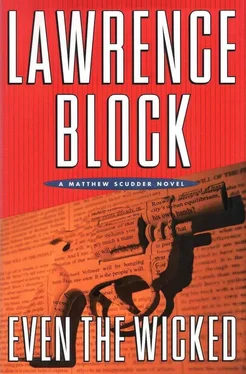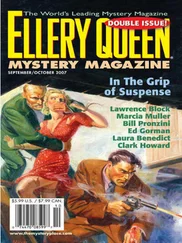“He in the park sellin’ product,” he said, “an’ soon as the dude commences to shoot, he ready to call it a day hisself. I can maybe put you ’cross a table from him, but that don’t mean he’s gone talk to you. ’Sides, what you gonna axe him that I didn’t axe him already?”
“‘Mr. Leopold? Byron Leopold?’”
“Don’t sound to me like he’s makin’ it up.”
“No,” I said, “it doesn’t.”
An hour later I was watching him eat french fries at a Fourteenth Street coffee shop. His cheeseburger was but a memory. He was wearing baggy jeans and a denim jacket with a quilted lining. His railroader’s cap was on the seat beside him.
I told him I had pretty much forgotten Byron Leopold.
“Why’s that?” he wondered. “You come to the conclusion he died of natural causes?”
“When I thought about it at all,” I said, “which wasn’t often, I suppose I figured he’d been taken for someone else and killed in error. Or that he’d unwittingly made an enemy in the neighborhood by sitting on the wrong bench or mouthing off at the wrong person. And he had AIDS, and he was far enough along so that the disease was visible. Maybe somebody had an AIDS phobia and decided the best cure lay in killing off the victims.”
“Like the dudes who set bums on fire.”
“As a quick cure for the problem of homelessness. That’s the idea. I didn’t think that was it, though, because that kind of killer doesn’t act once and then go off and enter a monastery.”
“He repeats.”
“Usually.” The waitress came by and filled my coffee cup without asking. The coffee wasn’t very good, but there was plenty of it. I said, “‘Mr. Leopold? Byron Leopold?’”
“Like that.”
“Making sure he’s got the right person.”
“Person he’s supposed to shoot. Like he knows the name but he never met him before. We brainstormin’, right? Battin’ ideas back and forth?”
“Something like that,” I agreed. “He sounds hired, doesn’t he?”
“The killer? You mean like a pro?”
“Not like a pro,” I said. “The whole thing’s too raggedy-ass for a pro. Here’s a man who’s alone a lot, leads a very regular life, hasn’t set up any security system to make himself hard to kill. It’s easy to get close to him in private, so why would a professional hitman kill him in front of witnesses?”
“Only reason I said a pro, Joe, is you said hired.”
“An amateur,” I said, “hired by another amateur. It pretty much takes a pro to hire a pro. You need to be connected, you can’t look up contract killers in the yellow pages. Ordinary citizens hire killers all the time, but there’s nothing terribly professional about the people who work for them.”
“An’ it don’t always work out the way it s’posed to,” he said. “Like the other day in Washington Heights.”
I knew the one he was talking about. It had been all over the papers the past few days. A Dominican teenager, bridling at her father’s strict discipline, had engaged a pair of local hard cases to kill the man, enticing them with the prospect of the $20,000 he kept in a strongbox in the closet, considering it ever so much safer than the bank.
So they showed up at the house one night and she let them in. She gave them the money, and then they were supposed to wait for Daddy to come home. But they got tired of waiting, and it occurred to them that he might be armed, and there was an easier way to close the account. So they took the girl who started the whole thing and shot her twice in the head, and they did the same for her sleeping mother and brother while they were at it, and then they went home. The father came home from work to find his family dead and his money gone. I bet his car wouldn’t start, either.
“In Washington Heights,” I said, “everybody had a reason. The girl was mad at her father, and the killers wanted the money.”
“So who had a reason to kill Byron?”
“That’s what I was wondering.”
“Didn’t have any money, did he?”
“Actually,” I remembered, “he had more money than he should have. He cashed in his insurance and he died with something like forty thousand dollars in the bank.”
“Ain’t that a motive?”
“He left it all to some AIDS charities. Some of those organizations are a little aggressive in their fund-raising, but I’ve never heard of them going out and killing for the money.”
“Besides, all they gotta do is wait, right? ‘Cause the man already dyin’.” He frowned. “You know what’d be nice? Piece of pie.” I beckoned the waitress over and he asked her what kind of pie she had, giving her response some careful attention. “Pecan,” he decided, “with some of that whatchacall a la mode on it. Say chocolate?” She looked at him, confused, and the street went right out of his speech. “I’ll have a piece of pecan pie,” he said, “with a scoop of chocolate ice cream.” She nodded and went away, and he rolled his eyes. “Now she be thinkin’ I a doctor. She be after me to take out her appendix.”
“Tell her your doctorate’s in botany.”
“That’s just as bad, Tad. She’ll have me talkin’ to her plants. If killin’ Byron didn’t put no money in nobody’s pocket, who’d hire somebody to do it?”
“I don’t know.”
“He had AIDS, right? But he wasn’t gay.”
“He got it from a needle.”
“He keep it all to hisself? Or did he pass it on?” I must have looked puzzled. “The virus, Cyrus. Who’d he go and infect?”
“He could have spread it around,” I said. “Years ago, before he even knew he had it.”
“So he gives it to some woman, and then her husband or her boyfriend or her brother wants to know how she got it. ‘Couldn’t be nobody but that no-account junkie Byron Leopold,’ she says.”
“Whereupon the husband or brother or whatever he is goes out and hires somebody to kill Byron.”
“Or does it his own self. Either way Byron’d be a stranger to him an’ he might axe him his name to make sure he didn’t kill the wrong person. ‘Mr. Leopold? Byron Leopold?’”
“Pop pop.”
“All she wrote,” he agreed.
“What about This is for Sheila, you dirty rat?’ The way he did it, Byron wouldn’t even know why he was dying.”
“If Sheila’s brother was doin’ it hisself, you’d ‘spect him to say somethin’. If he only hired the shooter—”
“The shooter might not bother with the oratory. Even if the brother did it himself, he could have a speech planned and be too nervous to deliver it.” I drank some coffee. “I don’t buy any of it,” I said. “Who takes that kind of revenge on a man with one foot in the grave? Byron Leopold was a bag of bones, his idea of a big day was sitting in the sun with his newspaper. No matter what he did to you, one long look at him and the resentment’d go right out of you.”
“What’s that leave? Suicide?”
“I thought of that.”
“Huh?”
“Say he didn’t want to live anymore but he couldn’t bring himself to take action. So he hires somebody to do it for him.”
“He’s afraid to stick his head in the oven, but he’s cool with the idea of waitin’ for somebody to sneak up and shoot him.”
“I said I thought of it. I never put it high up on the list.”
“’Sides, how’s he hire somebody who never met him face to face? You hire me to shoot you, I ain’t gonna have to ask you your name.”
“Forget it,” I said. “It never made any sense in the first place and it makes less sense now. Byron Leopold was murdered by someone who had a reason to kill him, and he himself was the only person in the world with a reason to want him dead. There ought to be a financial motive. That’s what it feels like, but there’s no money in it for anybody.”
Читать дальше












